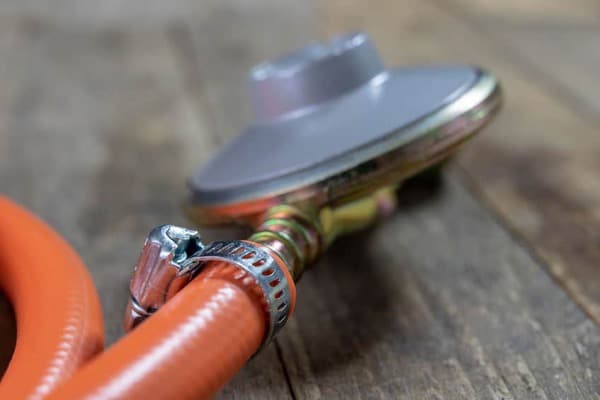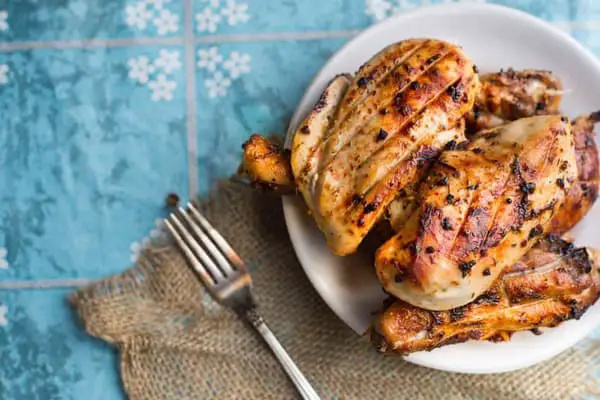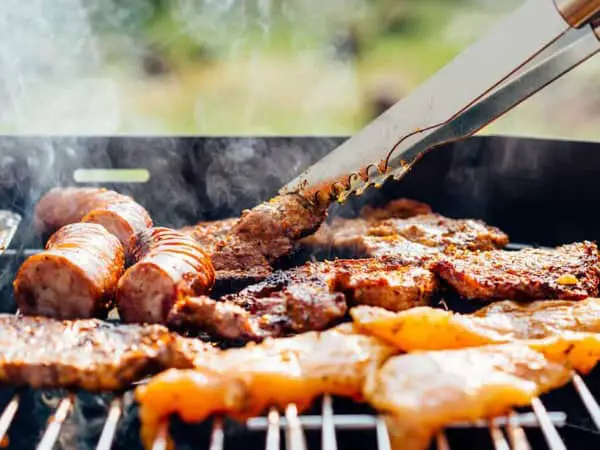
Barbecue grills are fantastic and make a decent summertime focal point ultimate outdoor memories. Stainless steel complements your grill well, making it wonderful to use and something to show off when grilling with friends and family. But does it give the same feeling for a lifetime?
Even though stainless steel grill grates are engineered to last for decades, they are part of your grill that you will have to replace at least once over your grill’s life. If you notice some corrosion, chipping, or flaking after some years of grilling, it is time to retire that stainless steel grate. But, this will take significantly longer to appear. Some grill users may opt to replace stainless steel grates because they lack authentic sear marks.
You may want to change your stainless steel grill grates for whatever reason. Nevertheless, it is noteworthy that stainless steel grill grates are engineered to be durable, easy to clean, and to heat up quickly for incurable barbecue grilling experience. In this article, you will find in-depth information on stainless steel grill grates, including when to replace them.
When to Replace Stainless Steel Grill Grates
The fact that high-end grill models come with stainless steel grates tells us something about the grates on top of the entire grill. Of course, everything comes with its pros and cons; therefore, don’t buy a grill with stainless steel grates expecting them to serve five generations.
Your grill with stainless steel grates has been a dependable sidekick for years of grilling delicious brats, veggies, burgers, and more. Unfortunately, even the most high-quality grill grates are susceptible to wear and tear.
Even though most grill masters tend to change their grill grates or the entire grill after three years, a stainless steel grill grate can last longer. Indeed, they are engineered to offer over seven years of exceptional and hassle-free grilling experience
If you feel that your stainless steel grill grates are not serving better anymore, it is time to replace them. Several viable reasons will determine when to replace your long-serving stainless steel grill grates. Find some of them below.
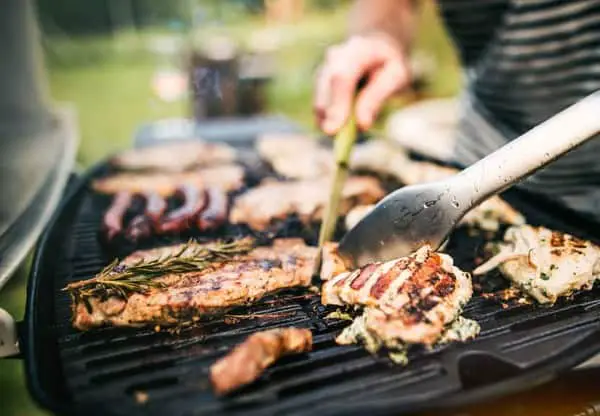
1. Corrosion of the grill grates
Although stainless steel grill grates contain a higher chromium amount, this does not mean it is immune to rust. When exposed to moisture and oxygen, oxidation will occur; therefore, resulting in rust. However, it is likely to take longer because of the nature of the alloy.
Small rust on your grates may not raise significant concern. This is because you can easily remove them using a wire brush. However, a considerably large amount of rust can be alarming and can be hard to remove using a wire brush. If you notice corrosion gets deep into the grate, replace it.
Rusty stainless steel grill grate can pose serious health issues over time. Therefore, replacing your stainless steel grates whenever they get too rusty is essential for your health and fantastic grilling experience.
2. Chipping away
It is apparent that even with ultimate care, the high-quality grill grates will wear out. A work out grate will present some challenges when cooking or grilling. Additionally, chips on grill grates give a hassle-free entry for moisture, which increases the chances of rust. If you notice your stainless steel grill grate is chipping away, it is time to retire it and get another.
3. When it is Hard to Clean
It goes unsaid that stainless steel grill grates are the easiest to clean because of the material’s nature. Even though these grates do not need much brushing and scraping, you need to take care of them by cleaning them at regular intervals.
If you don’t clean your stainless steel grill grates often, they will get so dirty that you can’t clean them. If your grate can’t shine after soaking it in soapy water and thorough brushing and scrubbing it with a wire brush, then know it is extremely tired to stay on top of your burners anymore. Replace your grill grates to continue enjoying outdoor summertime memories, but remember to clean your new grate regularly.
4. Choices and preferences
Not always will you find grilling enthusiasts changing their grates because they are damaged. At times you may opt to change your stainless gas grill because you need something that retains more heat for significantly longer. You may also be craving for better grilling sear marks that come with cast-iron grates. Grill masters will always prefer replacing their stainless steel grill grates with their cast iron counterparts because they exceptionally cherish the remarkable old-fashioned authentic searing experience. Upgrade and grill with what you like most.
5. Uneven Heating
You want something that is consistent and with even heat distribution. Even though the heating effect is associated with burners, some grill masters may want to change their considerably aged stainless steel grill grates if the temperatures on grill grates are not even.
6. Steel Grate
You may buy a grill featuring a stainless steel grate but have lower quality steel. The good news is that there are lots of high-quality aftermarket stainless steel grill grates. If you want to enjoy grilling for years, upgrade your original grill grate with stainless steel grate with a lower number.
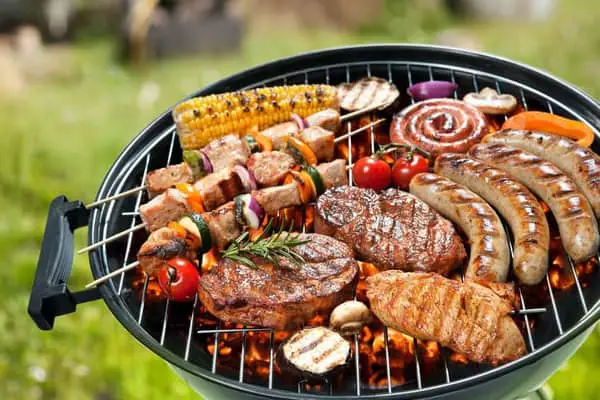
What Causes Rust on Stainless Steel Grill Grates?
This is a not uncommon question among grill masters. Stainless steel grill grates come first as far as quality and durability are concerned because they contain a higher chromium percentage ideal for reducing oxidation. However, they will rust with time when exposed to oxygen and moisture.
A grill, specifically the grate, are subjected to all kinds of abuse, which cause corrosion. From exposure to extreme temperatures, the grease splatters to elements if left unprotected. The good news is that the rust on your stainless steel grill grate can be removed with a wire brush or barbecue scraper then rinsing it with a solution of water and vinegar.
Stainless steel grill grates stand out for the fact that they are self-healing unless with extreme corrosion. Even with severe rusting, the stainless steel grill grates remain the easiest to clean.
How to prevent rust on stainless steel grill grates
Stainless steel grill grates are not much susceptible to rust like their cast iron counterparts and need the effort to maintain. However, this does mean you set and grill for years. To enjoy years of incredible grilling experience, it is good to season your grill before use. This will reduce stickiness, which is an accelerator of rust.
Indirectly, oiling helps prevent rusting by repelling moisture. Indeed, stainless steel grates are impervious to rust, but with seasoning, you enhance prevention; therefore, more years of ultimate grilling experience.
When brushing your stainless steel grill grate with a wire brush, make sure to do it with low energy. With excessive pressure, you can damage the aesthetic of your grate; therefore, exposing it to elements and increasing chances of rusting. Also, make sure to rinse it well. Most people have found that rust on stainless steel grill grates is caused by getting into contact with rust bearing metal, and we know that the pieces of wire brush can accelerate corrosion.
Lastly, make sure to keep your grill grates safe. It is ideal to keep your grill covered when not in use. By covering it, you will secure the grates and the entire grill from elements that may cause rust.
Seasoning Your Stainless Steel Grill Grates
Seasoning stainless steel grill grates can be an ideal way to prevent food from sticking on your grills. Seasoned grill masters know that oily grill grates are the beginning of perfect grilling. Before turning your grill on, apply some high-heat cooking oil on the grates. Wipe the excess oil and turn on the grill. Allow it to sit for about 15-20 minutes until the oil starts to burn.
Some of the best and recommended oils for seasoning your grill grates include:
- Canola oil
- Peanut oil
- Grapeseed oil
- Flaxseed oil
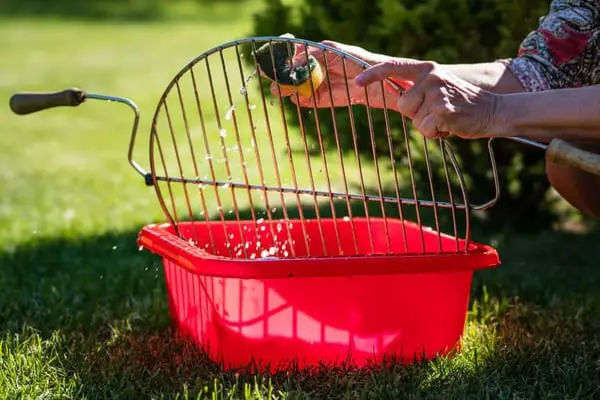
How to Remove Rust from the Stainless Steel Grill Grate
Rust on your grill grate isn’t appetizing at all; therefore, you should remove rust every time it occurs without procrastinating. Grill masters will do all that they can to prevent their grills from rusting, but it can as well happen. Here are some methods to clean rusty stainless steel grill grates.
Water and detergent: Mix warm water with some dish detergent in a bucket. Using a soft cloth or sponge, scrub your stainless steel and rinse it when clean. If you find stubborn rust, use a nylon brush to remove the particles. Anything abrasive can hurt the aesthetic of your stainless steel grill grates; therefore, it is ideal not to use wire or steel wool.
Vinegar and baking soda: Few people know the wonders a vinegar can work on rust. When vinegar is mixed with baking soda, they form a potent paste that does marvelous. Add little by little vinegar to a cup of baking soda until it forms a consistent paste. Using a sponge, rub the paste on your grates and allow it to sit for about 20-30 minutes. Scrub the grill grate using a soft material dip in warm water. Rinse with warm water.
Lemon juice and detergent: A mixture of lemon juice and powder detergent can make a fantastic rust-busting paste. However, it requires more time than vinegar-baking soda paste; it does magic overnight. All you need to do is apply the paste on the rusty stainless steel grill grate and leave it to mingle overnight. In the next waking, do the usual. Scrub it with a sponge or a soft cloth and warm water, then rinse with warm water.
Using Commercial Rust Remover: The above methods may not work as expected. If you attempt all the above techniques and still have traces of rust on your stainless steel grill grate, you may consider using commercial rust remover. Follow the instructions provided by the manufacturer to remove all rust stains. NEVER use a generic rust remover on the grill. They can leave behind some toxic chemical residues.
Benefits of stainless steel grill grates
The benefits of stainless steel grill grates offer you a reason to use them in your grilling. Here are some of the reasons why stainless steel grills are incredible for all cooking purposes and a great option
They are durable: This is one of the reasons you should go for stainless steel grill grates, whether upgrading or just replacing. Stainless steel grates are engineered to offer years if not decades of ultimate grilling and cooking experience. Unlike their cast iron counterpart, these grates are impervious to rust.
Stainless steel grates are easy to clean: The surfaces of stainless steel grates have an appealing smooth surface that makes cleaning very easy. Its nature lowers the chances of food sticking; therefore, you won’t have a hard time scrubbing the grates. Indeed, these may be the only grill grates you can carry to your utensil sink and wash them from there.
They are lightweight: stainless steel grates are light, making them easier to handle and maneuver when cleaning the entire grill.
The heat up quickly: Apart from heating quickly, stainless steel grill grates are engineered for consistent and even heat distribution. Being highly responsive becomes handy whenever you are late and can’t go without biting a ban.
Drawbacks of stainless steel grill grates
Stainless steel grill grates are more expensive to replace compared to cast iron grates. This is especially when they wear out when the warranty duration is over.
They don’t give the most sought-after authentic sear marks. This makes grill masters skip them and prefer the cast iron ones.
Despite that they heat quickly, stainless steel grill grates lose heat faster.
Conclusion
Stainless steel grill grates make an excellent option if you want to enjoy a remarkably superb grilling experience for a longer time. However, you will have to replace your grill when you find it hard to clean, too rusty, or flaking. With substantial care of your stainless steel grate, you may replace it anywhere between 5 and 15 years.

